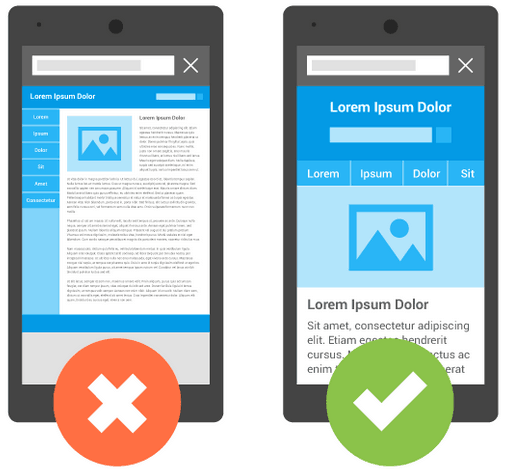In February, Google announced an update to their search engine ranking  algorithm that is based on whether a website is “mobile-friendly.” In their announcement, Google indicated that websites that are not considered to be mobile-friendly would suffer a negative impact in their search rankings. You can read the actual announcement here.
algorithm that is based on whether a website is “mobile-friendly.” In their announcement, Google indicated that websites that are not considered to be mobile-friendly would suffer a negative impact in their search rankings. You can read the actual announcement here.
Should you be concerned? How might your site be impacted and what should you do?
First, it’s clear that mobile devices represent a rapidly-growing percentage of website visitors at the expense of laptops and desktops. As phones become smarter and their screens become larger, more and more people are using their phones to access websites than ever before.
This means that, regardless of Google’s ranking policies, it just makes good sense to make sure your website caters to this growing audience.
A mobile-friendly site is one that can be easily read and navigated on a smart-phone. Simply shrinking the page down to fit a tiny screen isn’t enough if the user needs to zoom in and slide back-and-forth to read the copy. Selecting navigation menu options or completing a form is also next to impossible if everything on your screen is tiny.
Fortunately, most web designers and Content Management System (CMS) platforms like WordPress have had the ability to support mobile-friendly website design for some time. It does take some work, however. In general, simply adding a magic plug-in won’t make your site mobile-friendly. In most cases, if your site was built several years ago with no thought toward making it mobile-friendly, now would be a good time to give it an overhaul.
Below are some frequently asked questions our clients have asked us about this topic.
Q: When does this change go into effect?
A: Google says the update goes into effect on April 21, 2015.
Q: Will this change affect all searches?
A: At this point, only searches on Google’s mobile search engine are affected. According to Google, the search rankings for a mobile-unfriendly site should not be affected for users of desktop, laptop and tablet computers. Obviously, a ranking algorithm update on Google does not affect rankings on other search engines like Yahoo and Bing, but it’s likely they will follow suit.
Q: Will this change have an effect on paid searches?
A: Great question. Google has not mentioned paid search in their announcement. However, we know that Quality Score is impacted by “landing page relevance” and know that having a landing page that delivers a poor user experience is not something Google would want. Moreover, you should not want to pay for a mobile click if you know it’s going to land on a page that won’t render well on the user’s device. Whether or not Google will “protect” you by blocking your mobile ads is unclear at this point.
Q: Why did Google do this?
A: Google’s motivation has always been to provide a high quality experience to their search engine users. If someone on a mobile device uses Google search, it makes sense that they would rather be guided to a website that is clear and easy to navigate than to one that is not.
Q: How can I tell if my website is mobile friendly?
A: There are two parts to the answer. First, is the site truly mobile-friendly? The best way to judge this is to visit the site using a variety of smart phones (iOS, Android and Microsoft) and be candid in your assessment. Second, does Google think the site is mobile-friendly? Google provides a handy testing tool for this purpose. But be advised, we tried the tool on a number of sites and found several sites where the tool gave the site passing marks but the user experience on a mobile device was distinctly awful. We recommend using both methods.
Q: What percentage of website visitors are using mobile devices?
A: That depends on several factors. One factor is how you define a mobile device. The lines are blurring. Large tablets and devices like Microsoft Surface behave more like desktops or laptops. Another factor is the age of your audience. We find that younger people are more likely to use a mobile device to access web pages, so if your site needs to cater to a younger audience, this issue is particularly important to you, and not just because of Google’s latest update.





